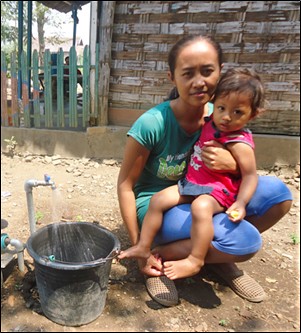
In Indonesia, the Government and USAID have entered into a partnership to provide sustainable water and sanitation services over five years. Sustainability means donors and recipients alike have assurances the services have actually been provided and will last.
With $38.7 million in USAID funding, the Indonesia Urban Water, Sanitation, and Hygiene (IUWASH) project operates in 54 cities across the archipelago. The project is now in its third year and has reached 1,163,855 people with water services and 77,655 people with sanitation services.
USAID’s Global Water Coordinator Christian Holmes recently visited Indonesia, and found the success of IUWASH relies on five key factors. Most important is the close partnership developed between USAID and the Government of Indonesia at all levels. Second is the program’s commitment to deliver very specific services, in particular physical connections for water and sanitation services to households. These things are supported by the program’s very effective reporting and monitoring systems and a dedicated team from the U.S. Government, Indonesian government agencies, Indonesian utilities, and Indonesians and Americans working for USAID’s implementing partner, DAI. Finally, is the consistent, productive engagement of civil society in the country. With these in place, USAID should meet its five-year target. In that time, IUWASH is expected to:
- Increase access to clean water for 2 million people in urban areas
- Increase access to sanitation for 250,000 people in urban areas
- Decrease per unit water costs paid by the urban poor by 20 percent
- Provide 75,000 people with water- and sanitation-related training







Comment
Make a general inquiry or suggest an improvement.